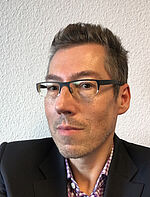University Professor Dr. Rolf Kailuweit

Chairholder Department II
Floor/Room: 00.31
Office Hours
Zur Zeit findet keine Präsenz-Sprechstunde statt. Bitte kontaktieren Sie mich per E-Mail.
Sie können auch einen Termin für eine telefonische Sprechstunde vereinbaren.
About
Since October 2017
W3-Professor for Romance Linguistics (Spanish and French) at the Heinrich-Heine University of Düsseldorf
February 2006
Change from a C3 Professorship for Romance Linguistics and Media Studies at the Romance Seminar at the University of Freiburg to a W3 Professorship, after turning down an offer at the University of Rostock.
Winter semester 2004/2005 – summer semester 2017
C3 Professorship for Romance Linguistics and Media Studies at the Romance Seminar at the University of Freiburg (W3 Professorship since 2006)
Winter semester 2003/2004 – summer semester 2004
Cover for a C4 Professorship in Romance Linguistics at the RWTH University in Aachen
May 2015 – April 2017
Director of the Hermann-Paul-School for Linguistics (Freiburg/Basel)
Summer semester 2011 – winter semester 2011/2012 and summer semester 2008 – winter semester 2008/2009
Internal Fellow at the Freiburg Institute for Advanced Studies (FRIAS) on the project “Constructional Schemas and the Lexicon – Evidence from Romance Languages und Ex cathedra in scaenam - The linguistic and medial construction of a transnational cultural area (Rio-de-la-Plata)
February 2010 – September 2011
Founding director of the Institute for Media and Culture Studies at the University of Freiburg
October 2009
Named as a corresponding member of the Academia Porteña del Lunfardo (Buenos Aires/Argentinien)
Since July 2008
Voluntary role as a Liaison Lecturer for the German National Academic Foundation.
April 2010
Winner of the Ideas Competition “Linguistic and Literature Studies” from FRIAS with a project on the literary language of Roberto Arlt with Prof. Volker Jaeckel / Belo Horizonte (Brazil) (Prize value: 15,000 Euro)
2003
Postdoctoral thesis (Habilitation) in the Modern Philology Faculty of the University of Heidelberg with the work: Linking. Zum Verhältnis von Syntax und Semantik französischer und italienischer Gefühlsverben.
1996
PhD at the Institute for Romance Philology at the Free University of Berlin with the work: Vom EIGENEN SPRECHEN – eine Geschichte der spanisch-katalanischen Diglossie (1759-1859)
Winter semester 1994/1995 – Summer semester 2004
Research fellow, assistant and senior assistant (Prof. Jens Lüdtke’s area of research) at the Romance Seminar of the University of Heidelberg
Summer semester 1993 – summer semester 1994
Research fellow (Prof. Jens Lüdtke’s area of research) at the Institute for Romance Philology at the Free University of Berlin
October 1991 – March 1993
Postgraduate studies and dissertation preparation at the University of Barcelona (Spain)
Summer semester 1984 – summer semester 1991
Law, Romance Studies and Philosophy at the Free University of Berlin and at the University of Barcelona
Advice for “Referate” (presentations) and “Hausarbeiten” (term papers)
With my help, presentations should be prepared in such a way that they satisfy the high pedagogical requirements.
- A presentation is given for the seminar, not for the lecturer
- Its primary aim is to transmit basic knowledge
- Seek out feedback through discussion and exercises
- Formulate study questions, if appropriate, which the course participants can answer in written form. The presenting group should evaluate the responses and give a briefly summary at the beginning of the next seminar.
For term papers, I agree on an individual question with the student. The question for a term paper is generally more specific than that for a presentation. Term papers are essentially independent small-scale research projects. For the formalities, the following stylesheet (see Downloads), which is valid for this Institute, can be taken as a basis.
Through writing term papers, you acquire basic work techniques, which also serve as preparation for final dissertations (BA/MA theses).
After I have corrected and evaluated your term paper, we will have another meeting. In this way, we can reflect on writing processes and discuss how to improve.
Somewhat older, but perhaps still useful, is the following advice about preparing presentations and writing term papers, which can be found here.
It is possible to collect data for seminar and final dissertation work through carrying out an online survey. Myriam Cremer has put together some guidelines on this.

